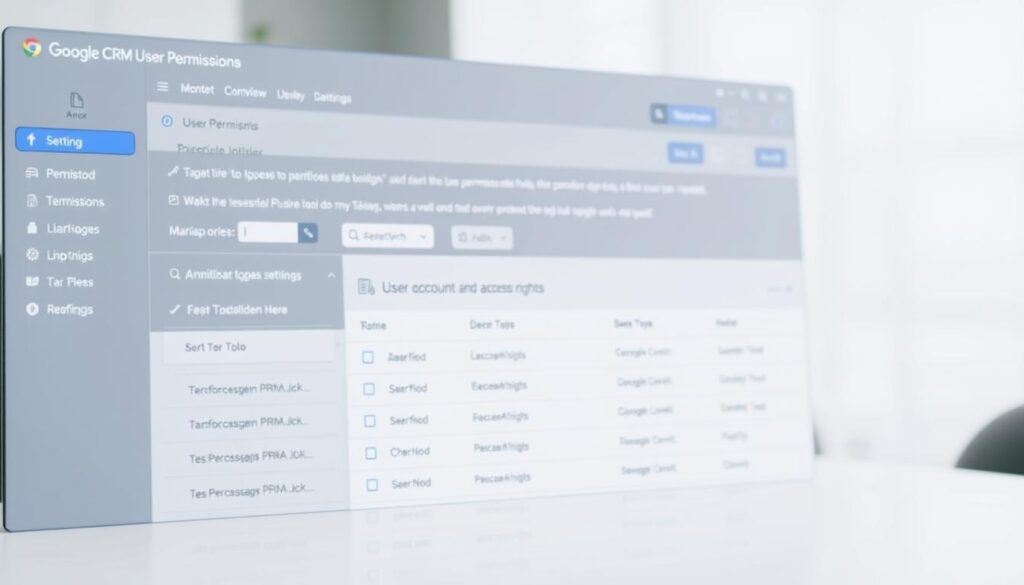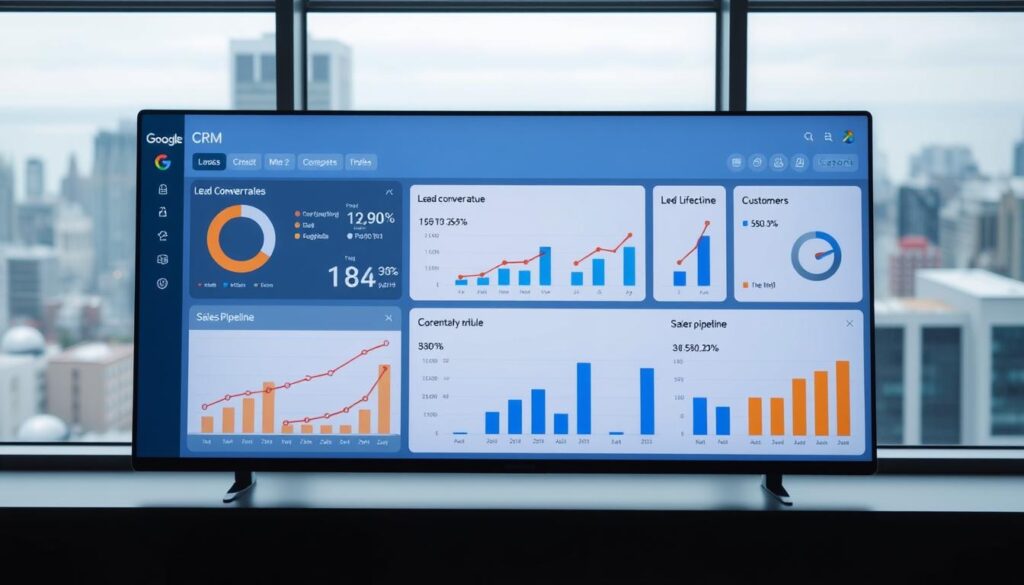Did you know that using CRM software can boost sales by up to 29%? In today’s fast-paced business world, it’s key to manage customer relationships well. We’ll show how businesses can use Google’s suite of tools to handle customer relationships effectively.
By linking Google’s tools with a strong CRM system, companies can make their processes smoother. They can also improve customer engagement and grow. This article will cover why Google Customer Relationship Management is important. We’ll also share tips and tricks to help businesses maximize their CRM software.
Key Takeaways
- Discover how to leverage Google’s suite of tools for effective CRM.
- Learn tips and tricks for integrating Google CRM with your business.
- Understand the benefits of using Google Customer Relationship Management.
- Explore how to enhance customer engagement using Google’s tools.
- Find out how to streamline processes with Google CRM integration.
What is Google Customer Relationship Management?
In today’s digital world, knowing about Google Customer Relationship Management is key for businesses. Google CRM uses Google’s tools to manage customer interactions and data well.
Efficient customer data management is at the core of a good CRM strategy. Google Cloud CRM helps businesses keep customer data in one place. This makes it easier to look at and understand customer info. Experts say, “A good CRM system can really boost customer happiness and loyalty.”
“CRM is not just about technology, it’s about strategy, process, and people.”
Google’s CRM tools make managing customer data easier for businesses. For more info on how Google CRM can help your business, check out Nethunt’s Google CRM blog. This blog shares how Google Cloud CRM can meet your customer management needs.
Using Google’s CRM solutions can improve our customer management. They offer seamless integration with other Google Workspace tools. This boosts teamwork and productivity.
Benefits of Using Google for CRM
Google’s CRM solutions bring many benefits to businesses. They help manage customer relationships better. By using Google’s tools, businesses can work more efficiently.
Enhanced Collaboration Features
Google’s CRM has enhanced collaboration features. Google Workspace lets teams work together in real-time, no matter where they are. This makes communication smooth and keeps everyone informed.
A CRM expert says, “Collaboration is key to successful CRM implementation.” Google’s tools help teams work better together. This leads to happier customers and stronger loyalty.
Integration with Google Workspace
Google CRM works well with Google Workspace. This means businesses can use Gmail, Google Drive, and Google Docs all in one place. It makes work easier and more productive.
- Seamless integration with Gmail for email marketing
- Access to Google Drive for storing customer data
- Real-time collaboration using Google Docs
Cost-Effectiveness
Google’s CRM solutions are also cost-effective. They use Google’s infrastructure, saving businesses money. This makes Google CRM a great choice for any business size.
“Google’s CRM solutions offer a cost-effective way to manage customer relationships, allowing businesses to allocate resources more efficiently.” – CRM Industry Expert
Key Features of Google CRM Tools
Google CRM has features like customizable dashboards, automated email marketing, and customer insights. These help businesses manage customer relationships better. They also make sales processes smoother and drive growth.
Customizable Dashboards
Google CRM’s customizable dashboards stand out. They let users focus on the most important data. This way, businesses can quickly make informed decisions.
- Track key performance indicators (KPIs) in real-time
- Monitor sales pipeline progress
- Analyze customer interaction data
Automated Email Marketing
Google CRM also has automated email marketing. It helps send targeted campaigns to customers and prospects. This feature:
- Personalizes customer communications
- Saves time by automating routine emails
- Improves customer engagement with timely messages
Customer Insights Analytics
Understanding customer behavior is key for CRM. Google CRM’s customer insights analytics give businesses a deeper look at their customers. They can:
- Analyze data to spot trends and patterns
- Make decisions to boost customer satisfaction
- Customize marketing for different customer groups
By using these features, businesses can get the most out of Google CRM. This improves their customer management and leads to long-term success.
How to Set Up Google CRM for Your Business
Setting up Google CRM for your business is easy and can really help manage your customer relationships. We’ll show you how to start using Google CRM. This will make your business operations smoother.
Step-by-Step Guide
To start, go to the Google CRM dashboard and follow these steps:
- Log in with your Google Workspace credentials.
- Click on the “Setup” wizard to configure basic settings.
- Customize your dashboard by adding relevant widgets.
Customizing your dashboard is key to quickly finding important features. You can add widgets for sales tracking, customer interactions, and more.
Importing Existing Data
Importing your current customer data into Google CRM is a big step. Here’s how to do it:
- Prepare your data by formatting it according to Google CRM’s guidelines.
- Use the import tool to upload your data into the system.
- Verify the data to ensure accuracy and completeness.
Accurate data import is crucial for using Google CRM well. Make sure your data is clean and well-formatted before importing.
| Data Type | Import Method | Notes |
|---|---|---|
| Customer Contacts | CSV Upload | Ensure contacts are correctly formatted |
| Sales Records | API Integration | Use Google’s API for seamless integration |
| Customer Interactions | Manual Entry or CSV | Track emails, calls, and meetings |
Setting User Permissions
Setting the right user permissions is key for keeping data safe and making sure team members have what they need.
- Define roles based on job functions within your organization.
- Assign permissions to each role, controlling access to sensitive data.
- Regularly review and update permissions as your team evolves.

By following these steps, you can set up Google CRM for your business. This will improve your customer relationship management and help your business grow.
Best Practices for Utilizing Google CRM
Using Google CRM well can really help businesses manage their customer relationships better. This leads to happier customers and more loyalty. To get the most out of Google Workspace CRM, there are a few key strategies to follow.
Regular Data Updates
Keeping customer data up to date is crucial. It means doing periodic reviews of customer info to keep it current. This helps in making smart decisions and keeps the database clean.
Businesses should plan regular data checks. They should also have a system to check if the data is correct before adding it to the CRM.
Monitoring Customer Interactions
It’s important to watch how customers interact with your business. This includes emails, phone calls, and social media. By tracking these interactions, you can learn a lot about what customers like and don’t like.
Using the analytics in CRM software can help understand these patterns. This way, you can make marketing plans that really speak to your customers. It helps you meet their needs better and makes them happier.
Creating Segmented Lists
Segmenting customer lists is a smart marketing move. It means dividing lists based on things like who they are, what they’ve bought, or how they’ve interacted with you. This way, you can send messages that really hit home with your audience.
This method makes your marketing more effective. It also makes sure you’re talking to the right people at the right time. This boosts customer engagement and satisfaction.
Integrating Google CRM with Other Tools
Connecting Google CRM with other tools boosts its power. It lets businesses automate tasks, analyze data better, and talk to customers more effectively.
Linking with Social Media Platforms
Connecting Google CRM to social media helps track customer interactions. This lets companies understand what customers like and don’t like. It helps make marketing plans that really work.
Benefits of Social Media Integration:
- Enhanced customer engagement
- Improved tracking of customer interactions
- Better data analysis for targeted marketing
Utilizing Third-Party Applications
Google CRM can work with many third-party apps to do more. These apps can be for marketing or customer service, making CRM better.
| Third-Party Application | Functionality | Benefits |
|---|---|---|
| Marketing Automation Tools | Automate marketing campaigns | Increased efficiency, personalized marketing |
| Customer Service Software | Enhance customer support | Improved customer satisfaction, faster response times |
Automating Your Workflow
Automating Google CRM workflows cuts down on manual work. This lets businesses do more strategic things. Automation makes processes smoother, data more accurate, and work more productive.
Key aspects of workflow automation include:
- Automating repetitive tasks
- Setting up triggers and actions
- Monitoring and adjusting workflows as needed
By linking Google CRM with other tools and automating, businesses get more efficient. This leads to better customer relationships and business results.
Tips for Training Your Team on Google CRM
Training your team well is key to using Google Customer Relationship Management (CRM) effectively. We must invest in detailed training that covers its main features and best practices. This ensures our team gets the most out of Google CRM.
Regular Training Sessions
Regular training is essential to keep our team up-to-date with Google CRM’s latest features. By having regular sessions, we make sure everyone knows how to use Google CRM well.
These sessions can be in different formats, like workshops, webinars, or online training modules. This lets us pick the best way to train our team.
Creating Resource Materials
Creating detailed resource materials is also crucial for training our team. These can include user guides, video tutorials, and quick reference cards. They give step-by-step instructions on using the platform.
With these materials, our team can learn at their own pace. They can also refer back to them when needed. This helps reduce mistakes and boosts productivity.
Encouraging Team Collaboration
Encouraging team collaboration is vital for Google CRM’s success. We need to create a space where team members can share, ask, and give feedback. This builds a culture of teamwork and learning.
We can do this through regular team meetings, online forums, or collaboration tools. These help team members communicate and share knowledge.
Measuring Success with Google CRM
To see how well our Google CRM works, we need to look at important metrics. Measuring success with Google CRM means checking many performance signs. These signs show how well we connect with customers and sell products.
Choosing the right metrics is key when using Google CRM. Key performance indicators (KPIs) are crucial here. They tell us if our CRM plans are working as they should.
Key Performance Indicators (KPIs)
KPIs are measurable signs of how well our CRM system does. Important KPIs for Google CRM include:
- Conversion rates
- Sales cycle length
- Customer acquisition cost
- Customer retention rates
By watching these KPIs, we can make our CRM better. This helps us sell more and keep customers happy.

Customer Satisfaction Metrics
How happy our customers are is very important for CRM success. Metrics like customer satisfaction scores (CSAT) and net promoter scores (NPS) show how our customers feel about us.
Checking these metrics often helps us see where we can get better. This way, we can make choices based on real data to improve our customer service.
Analyzing Sales Trends
Looking at sales trends helps us see how our Google CRM affects our sales. By studying sales data, we find patterns and see what’s working and what’s not.
This helps us tweak our sales plans. We can make our sales process better and grow our revenue with smart CRM automation.
In short, to measure Google CRM success, we need to look at KPIs, check customer happiness, and study sales trends. Using these insights, we can improve our CRM strategies for better results.
Common Challenges and Solutions in Google CRM
Businesses often face hurdles when they start using Google CRM. It can be complex to set up. Knowing the common problems helps make the transition smoother.
Data Migration Issues
Moving customer data to Google CRM can be tough. It’s even harder with big datasets.
To solve data migration problems, do the following:
- Plan the migration carefully, ensuring all data is mapped correctly.
- Use data migration tools provided by Google or third-party vendors to streamline the process.
- Conduct thorough data audits before and after migration to ensure data integrity.
User Adoption Barriers
Getting everyone to use Google CRM can be hard. People often resist change.
To help users get used to Google CRM, try these:
- Provide detailed training sessions to teach users about the CRM’s features.
- Make guides and resources easy to use for ongoing learning.
- Listen to user feedback to quickly solve any problems.
Technical Glitches
Google CRM, like any tech, can have bugs and integration problems.
To fix technical issues, do the following:
- Keep your Google CRM up to date with the latest features and fixes.
- Watch the system’s performance and fix problems fast.
- Use Google’s support and community forums for help with common issues.
By tackling these common problems and using the right solutions, businesses can get the most out of Google CRM. This improves how they manage customer relationships.
| Challenge | Solution |
|---|---|
| Data Migration Issues | Plan migration carefully, use migration tools, conduct data audits |
| User Adoption Barriers | Provide comprehensive training, create user guides, encourage feedback |
| Technical Glitches | Regularly update CRM, monitor system performance, utilize support resources |
Future Trends in Google Customer Relationship Management
Google Customer Relationship Management is set for big changes. These changes come from new tech and what customers want. Google CRM is leading the way in how businesses talk to their customers.
Impact of Emerging Technologies
AI and automation will change how we talk to customers. Google CRM will help businesses give personal experiences to many people. AI will help guess what customers need and make responses better.
Personalization and Customer Experience
Personalizing customer interactions is key now. Google CRM uses data to make marketing better. This makes customers more engaged and loyal.
Data Privacy Considerations
Data privacy is crucial for Google CRM’s future. Businesses must protect data and follow rules. This builds trust and lasting relationships with customers.



